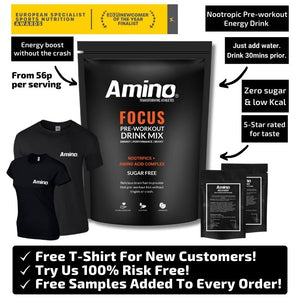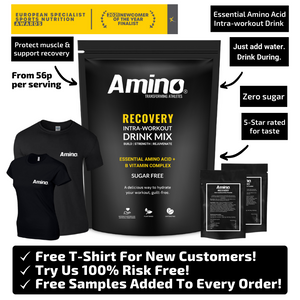Amino acids are having a bit of a moment right now, but you may be unsure what they’re for and the benefits of adding a supplement to your diet. In this article, we lead you through the top 10 benefits of essential amino acids so you can make an informed decision.

Whatever your sport and whatever your goals, it’s vital to support your muscle mass, organs and endocrine system (hormones) during training... Whether you’re a gym go-er looking to enhance fat loss, a bodybuilder taking on top form, or an athlete aiming for peak performance, supporting your recovery process is of utmost importance, in order to protect yourself from the damaging effects and stress placed on the body during high-intensity exercise.
Getting amino acids to where they’re needed is a key requirement for repair, growth and adaptation. Without optimum support, recovery cannot be activated effectively. If this continues over a long period, injury, deficiency and disease can occur.
Free-form Essential Amino Acids (EAAs) can be powerful tools in this process. They can support the body's recovery from exercise and provide some unique benefits.
Although they’re not for everyone and every situation, they can be very useful for specific demographics.
Here are our top 10 benefits, so you if free-form essential amino acids are they are a good option for you.
1. Preserve Muscle Mass.
Muscle is an important tissue to protect, especially under certain conditions. For instance, during periods of calorie deficit when trying to cut body fat, or during bouts of duration exercise such as intermittent sprint sports or endurance training.
Protein decomposition and breakdown is a constant function and muscle gain, maintenance and loss are dependent on the ratio of protein deposits vs protein breakdown. Essential amino acids can help to prevent the net loss of muscle and are even more effective when calorie intake is insufficient or when the athlete is older in age because protein digestion and assimilation are less efficient. [1,3,8,10]
Read more: The 6 most important principles behind building muscle
2. Stimulate and Aid Protein Synthesis.
The evidence that amino acids stimulate muscle protein synthesis is clear. The amino acid leucine plays a particularly large role in this.
If you're looking to support muscle mass, amino acids are a great tool because they cause a spike in the amino acid profile of blood faster than any other performance aids. This means they promote healing and switch on the muscle repair process. [2,5,6,7]
Read More: Do amino acid supplements really work?
3. Low in Calories.
We know the most effective fat loss method available is calorie restriction. If you're looking to reduce your calorie intake to support fat loss, amino acids can play a part. They are much lower in calories than other whole chain ergogenic aids because the energy has already been released from their bonds.
Read more: Lose fat the smart way
4. Reduce Muscle Soreness.
Although the science to show that amino acids limit muscle damage and promote protein synthesis is very strong, our ability to feel these effects is subjective. There is evidence that amino acid supplementation reduces muscle soreness but this may come down to the individual. [4,12]
Read more: How to combat post-exercise aches, DOMs?
5. Free from Digestive Issues.
Because free form amino acids are already broken down, they are easy on your digestive and readily absorbed. This makes them the superior choice for athletes that suffer from digestion issues like IBS or Crohn's disease. This is also the case where muscle recovery is critical but digestion is impaired due to vascular shunting, resulting in a lack of blood to the digestive tract, for instance, during endurance training or intermittent sprint team sports. Heavy protein shakes that take time to digest and sit in the stomach are far less effective and may cause gastric-emptying issues while training.
6. Non-Inflammatory.
Amino acids are non-inflammatory so are a good choice for athletes with underlying health issues or inflammatory disorders. These may include IBS, diabetes, allergy, asthma, autoimmune diseases, Crohn’s disease or coeliac disease to name a few. Whey proteins are pro-inflammatory and are not tolerated well unless you’re in tip-top condition. [7]
Read more: The best and worst foods for sore muscles
7. Protect Immune Function.
The immune system is critical for the healthy functioning of the human body. This system is compromised when training volumes and intensities are pushed up, for instance, during heavy training periods. Amino acids are the building blocks of all endocrine systems, key hormones and elements. Supplementation can support your immune system from breaking down during intense training periods. [11]
Read more: How to stop a cold in its tracks?
8. Energy Production for Endurance Athletes.
If you compete in an endurance sport there is some evidence to shows the amino acid supplementation can aid with mitochondria production. These are the energy units of all our cells. With more mitochondria, you should be able to work harder while using the same amount of energy.
9. Fatigue Reduction.
There is some evidence to show that amino acid supplementation can help to enhance fatigue resistance during workouts. Branch chain amino acids (BCAAs) can prevent serotonin build-up in the brain which leads to a drop in drive and motivation, so these may aid focus and improve energy while delaying fatigue.
10. Metabolic and Digestive Health Aid
There is a lot of evidence to show that EAA supplementation can support and aid both metabolic and digestive health, especially as we age. As we get older amino acids to become more important for several reasons. First, our diets may not contain adequate amounts of protein to support natural protein breakdown within the body. Second, digestion is less effective as we age due to reducing levels of hydrochloric acid and digest enzymes. Other reasons include proteins and amino acids being poorly assimilated, so they don’t make it to the cell. Plus, amino acids may be used as energy if inadequate amounts are available from other sources, such as fats and carbohydrates. This means they cannot be, used for growth and repair. [9]
Recover Better, Train Harder
Amino RECOVERY is an intra-workout drink created with the EAAs, BCAAs and B vitamins you need to protect muscle mass and recover faster. Allowing you to keep the gains you've worked so hard to achieve!
ENJOYED THIS ARTICLE?
Find out more about how amino acid supplements can help to support a healthy lifestyle, plus get 10% off your first Amino order.
References
[1] Arny A Ferrando, Doug Paddon-Jones, Nicholas P Hays, Patrick Kortebein, Ola Ronsen, Rick H Williams, Ashley McComb, T Brock Symons, Robert R Wolfe, William Evans (2010) EAA Supplementation to Increase Nitrogen Intake Improves Muscle Function During Bed Rest in the Elderly
[2] Guoyao Wu Author Notes (2010) Functional Amino Acids in Growth, Reproduction, and Health
[3] Elena Volpi, Hisamine Kobayashi, Melinda Sheffield-Moore, Bettina Mittendorfer, Robert R Wolfe (2003) Essential amino acids are primarily responsible for the amino acid stimulation of muscle protein anabolism in healthy elderly adults
[4] Mark Waldron, Kieran Whelan, Owen Jeffries, Dean Burt, Louis Howe, Stephen David Patterson (2017) The Effects of Acute Branched-Chain Amino Acid Supplementation on Recovery From a Single Bout of Hypertrophy Exercise in Resistance-Trained Athletes
[5] Rennie MJ, Bohe J, and Wolfe RR (2002) Latency, duration and dose-response relationships of amino acid effects on human muscle protein synthesis.
[6] Wolfe RR (2002) Regulation of muscle protein by amino acids
[7] R N Saxena, V K Pendse, N K Khanna (1984) Anti-inflammatory and Analgesic Properties of Four Amino-Acids
[8] Edgar L Dillon, Melinda Sheffield-Moore, Douglas Paddon-Jones, Charles Gilkison, Arthur P Sanford, Shanon L Casperson, Jie Jiang, David L Chinkes, Randall J Urban (2009) Amino Acid Supplementation Increases Lean Body Mass, Basal Muscle Protein Synthesis, and Insulin-Like Growth factor-I Expression in Older Women
[9] Francesco Bifari, Chiara Ruocco, Ilaria Decimo, Guido Fumagalli, Alessandra Valerio & Enzo Nisoli (2017) Amino acid supplements and metabolic health: a potential interplay between intestinal microbiota and systems control
[10] Wesley David, Dudgeon Elizabeth, Page Kelley, Timothy Paul Scheett (2016) In a Single-Blind, Matched Group Design: Branched-Chain Amino Acid Supplementation and Resistance Training Maintains Lean Body Mass During a Caloric Restricted Diet
[11] Peng Li, Yu-Long Yin, Defa Li, Sung Woo Kim (2007) Amino acids and immune function
[12] Fedewa et al (2019) Effect of branched-chain Amino Acid supplementation on muscle soreness following exercise: A meta-analysis







